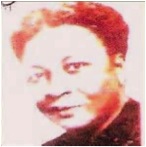In this edition, Dr Toju Chike-Obi(our Pediatrician) introduces a dear friend and a hero to our nation. Meet our next amazing icon.
I give God praise for Dr. Ameyo Adadevoh’s life and for the privilege of having known her. Ameyo was pint-sized but had a huge heart. Her bubbly, irrepressible personality was larger than life. The dimples, the big laughter and the rapid-fire speech brought a lot of fun and silliness to our medical school days. Ameyo was that rare friend that for 40 years, regardless of the miles that separated us and the sometimes infrequent contact, there wasn’t a time I called with a need that she could meet that she didn’t help out and give it her all. Her huge heart, leadership and commitment to her profession was reflected in her handling of the index Ebola case and may have saved millions of lives, not just in Nigeria but throughout the world. When thoughts of having lost her threaten to overwhelm, I focus on the indisputable fact that her life counted and made a difference for an untold number of people. I hope that it also brings some comfort to her family, friends and colleagues. My prayer is that her actions and her death will make for lasting change in the health system and her sacrifice will bring out the very best that is in all of us.
DR. AMEYO STELLA ADADEVOH: BIOGRAPHY
Dr. Ameyo Stella Adadevoh was the lead physician and endocrinologist at First Consultants Medical Centre, Lagos, Nigeria.
Born October 27, 1956, she attended Queens College, Ibadan and obtained her medical degree at the College of Medicine of the University of Lagos. She received specialty training in Endocrinology in the U.K. and returned to take up the position at First Consultants Medical Centre in Lagos, a position she held for 21 years until her death on August 19, 2014.
Her paternal great grandfather, Herbert Samuel Macaulay, was a prominent politician and is considered to be the founding father of Nigerian nationalism. He established the first political party. Her maternal grandfather was the first cousin of Dr. Nnamdi Azikiwe, the first President of Nigeria, Her father, Babatunde Kwaku Adadevoh, was a renowned physician, distinguished scientist, lecturer, author, and former Vice-Chancellor of the University of Lagos.
In 2012, H1N1 (swine flu) spread to Nigeria and Dr. Adadevoh, a keen clinician, was the first doctor to diagnose and alert the Ministry of Health. Less than two years later, she was again the first doctor to identify another contagious virus, – this one much deadlier than the first.
In July 2014, even though she had never treated an Ebola case before, she was again able to properly diagnose and resist pressure to release Nigeria’s index Ebola patient, Thomas Sawyer, a Liberian national. The Nigerian health system was not prepared for an outbreak at the time and proper isolation protocols were not in place quickly enough. She contracted Ebola and died on 19 August 2014. Her heroic efforts prevented a major outbreak in the most populous African country and served as the catalyst for swift government action in containing the spread of Ebola.
As a result of her keen perception, courage, and steadfastness, all 20 Ebola cases in Nigeria could be traced to a single path of transmission originating with the index patient. This is what differentiated the Ebola outbreak in Nigeria from the major outbreaks in Guinea, Liberia, and Sierra Leone. Due to her actions, Nigeria was able to contain the virus and the World Health Organization declared Nigeria Ebola-free on 20 October 2014. Nigeria immediately became a model, with other countries looking to Nigeria to share best practices for the response and containment of Ebola. Her huge heart, leadership and commitment to her profession was reflected in her handling of the index Ebola case and may have saved millions of lives, not just in Nigeria but throughout the world.
Toju Chike-Obi, MD
REFERENCE: Dr Ameyo Stella Adadevoh Health Trust




